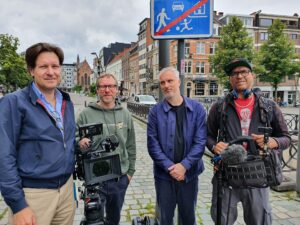To better understand the natural course of pandemics, old medical records from the Russian flu pandemic between 1889 and 1891 served as references during the COVID-19 pandemic. However, studies found that the Russian flu pandemic might actually have been a coronavirus pandemic. Several media outlets became interested in this story, one of them producing the German documentary “Spillover – Planet der Viren” (“Spillover – planet of the viruses”). In this #FEMSmicroBlog, Harald Brüssow, Fellow of the European Academy of Microbiology (EAM), discusses the links between the two viral pandemics and his experience as a consultant for media outlets. #TheCulturePlate
What is the main scientific message that you put forward in the Spillover TV programme?
I focused essentially on a One Health message linking human, veterinary and environmental health. Over the past years, we learned that close encounters between humans and animals increase the risk of virus transmissions.
These encounters happen particularly with wild animals but also in unnatural animal-animal settings like wet markets. We can learn many lessons from past pandemics for both ongoing pandemics and future pandemic threats.
Which evidence do you have that the Russian Flu pandemic (1889 to 1891) might have been a coronavirus pandemic?
At that time, viruses were still unknown and Koch’s postulates for pathogens not established. So, flu was the consensus opinion for that particular pandemic. However, in contrast to the Spanish flu pandemic, scientific evidence for an Influenzavirus association was weak.
In the middle of the COVID-19 pandemic, I wanted to explore the natural duration, distinct waves and recurrence of respiratory pandemics from available historical records. Spanish flu was a proven influenza pandemic, so the nearest experience to COVID-19 was the Russian flu.
I screened contemporary medical records and medical journals on the Russian flu from 1890. When reading the reports, I was struck by the similarity in clinical symptoms and epidemiological characteristics seen between COVID-19 and the Russian flu pandemic, culminating in the study “Clinical evidence that the pandemic from 1889 to 1891 commonly called the Russian flu might have been an earlier coronavirus pandemic”.
A Leuven virologist then provided additional support for a possible coronavirus link. They interpreted a current human common cold coronavirus as a potential trans-species event between cows and humans dating back to 1890, a year of major cattle culling.
How can we better prepare for future pandemics based on the spillover of diseases from animals to humans?
Physicians should be very attentive to early signals of new or re-emerging viral diseases and survey suspicious clusters of unexplained febrile illnesses. The scientific community should conduct proactive research in human populations exposed to disturbed natural environments (e.g. during deforestation). Virological surveillance of live animal markets should be enhanced.
How did you get involved in the German Spillover TV documentary?
I am currently an industrial consultant for topics around COVID-19 and phage therapy as well as editor and board member for scientific journals. I had published several editorials and reviews on cross-species infections and pandemic preparedness.
The media caught attention of my scientific output, like my book “The Quest for Food”, and science journalists from newspapers like New York Times, Le Monde, Neue Züricher Zeitung and radio shows like Deutschlandfunk invited me to discuss the Russian flu topic. Michael Wech, the producer of the Spillover film, asked me by e-mail to participate in his film and I accepted.

What advice would you give to other researchers about potentially getting involved with the media?
I would recommend openness towards journalistic requests from mainstream media for information since they have the potential to transmit scientific messages to a wider audience. However, as an industrial scientist, I had only few media contacts and now as a retired scientist, I am not even active on social media. So, I am sure more can be done.
What’s the key takeaway from your experience featuring in Spillover?
The public discussion on COVID-19, its origin and containment measures (masks, vaccines, lockdown) were in part toxic and divisive and exploited for political goals. The Spillover film with its objective and balanced messages on pandemic threats was sent in the leading German TV channel at prime time.
The hope was to contribute to a rational discussion on infection threats and boost the perception of scientific research in times of adverse political attitudes towards science in the public health sector. Instead of leaving the field to all kinds of influencers on social media, scientific organisations such as EAM and FEMS should inform the public on hot topics around public health. This becomes particularly important now as our American colleagues are increasingly under pressure.
- Watch the documentary “Spillover – Planet der Viren” (in German) featuring Harald Brüssow, Fellow of the European Academy of Microbiology (EAM)
 Harald Brüssow studied Biology in Düsseldorf sponsored by German Academic Scholarship Foundation, and did his PhD in Virology at the Max Planck Institute for Biochemistry in Munich. From 1981 until 2017, he was a research scientist at the Nestlé Research Center in Lausanne investigating various aspects of Nutrition and Health, including epidemiology, passive immunity, food biotechnology, phage therapy, probiotics and clinical trials. After his retirement, he became an industrial consultant, editor and board member for scientific journals and guest professor at KU Leuven, Belgium. He wrote the book “The Quest for Food” and is an EAM Fellow.
Harald Brüssow studied Biology in Düsseldorf sponsored by German Academic Scholarship Foundation, and did his PhD in Virology at the Max Planck Institute for Biochemistry in Munich. From 1981 until 2017, he was a research scientist at the Nestlé Research Center in Lausanne investigating various aspects of Nutrition and Health, including epidemiology, passive immunity, food biotechnology, phage therapy, probiotics and clinical trials. After his retirement, he became an industrial consultant, editor and board member for scientific journals and guest professor at KU Leuven, Belgium. He wrote the book “The Quest for Food” and is an EAM Fellow.
About this blog section
The section #TheCulturePlate for the #FEMSmicroBlog aims to bring science closer to different audiences and to tell more about the scientific or personal journey to come to the results.
| Do you want to be a guest contributor? |
| The #FEMSmicroBlog welcomes external bloggers, writers and SciComm enthusiasts. Get in touch if you want to share your idea for a blog entry with us! |

